PCR, or polymerase chain reaction, is a diagnostic tool used to identify specific genetic material in a sample. This powerful technique has revolutionized various fields, from medical diagnostics to forensic science and automotive diagnostics. It allows for the detection of even minute quantities of DNA or RNA, making it invaluable for identifying pathogens, genetic mutations, and other biological markers.
Similar to malaria diagnostic tools, PCR can amplify specific sequences of DNA or RNA, increasing their concentration exponentially. This makes it possible to detect the presence of a target sequence even if it’s present at very low levels in the original sample. In the context of automotive diagnostics, PCR can be used to identify the presence of specific bacteria or viruses that may be contributing to vehicle malfunctions.
How PCR Works as a Diagnostic Tool
The PCR process involves a series of temperature changes and enzymatic reactions to amplify the target DNA or RNA sequence. This process typically consists of three main steps: denaturation, annealing, and extension. During denaturation, the double-stranded DNA is heated to separate the two strands. Annealing involves lowering the temperature to allow primers, short DNA sequences that are complementary to the target sequence, to bind to the separated strands. Finally, during extension, a DNA polymerase enzyme extends the primers, creating new copies of the target sequence. This cycle is repeated multiple times, resulting in an exponential increase in the number of copies of the target sequence.
PCR in Automotive Diagnostics: Identifying the Unseen
PCR’s sensitivity makes it a powerful tool for identifying elusive problems in vehicles. For instance, it can be used to detect the presence of bacteria in fuel systems, which can lead to performance issues and fuel degradation. Furthermore, PCR can be helpful in identifying the presence of specific viruses that may affect the electronic control units (ECUs) of modern vehicles.
What specific issues can PCR identify in a car? Well, imagine a persistent problem with the fuel injectors. Traditional diagnostic methods might not pinpoint the root cause, but PCR could reveal the presence of bacteria clogging the system, a problem otherwise difficult to detect.
Advantages of Using PCR as a Diagnostic Tool
PCR offers several key advantages as a diagnostic tool. Its high sensitivity allows for the detection of even trace amounts of target DNA or RNA, enabling early diagnosis of infections and other conditions. Furthermore, PCR is highly specific, meaning it can accurately distinguish between closely related organisms or genetic sequences. This specificity is crucial in automotive diagnostics, where accurate identification of the problem is essential for effective repair. Finally, PCR is relatively fast, providing results in a matter of hours, compared to traditional methods that may take days or even weeks.
“In my experience, PCR has become an indispensable tool in automotive diagnostics,” says Dr. Emily Carter, a leading expert in automotive engineering. “Its ability to quickly and accurately identify pathogens and other biological markers has significantly improved our ability to diagnose and resolve complex vehicle issues.”
Limitations of PCR in Automotive Diagnostics
While PCR is a powerful tool, it’s essential to be aware of its limitations. The technique requires specialized equipment and trained personnel, which can increase the cost of diagnostics. Furthermore, PCR is highly sensitive to contamination, meaning that even small amounts of extraneous DNA or RNA can lead to false positive results. This necessitates meticulous sample handling and laboratory procedures.
Just like pcr not a diagnostic tool, there are situations where PCR might not be the best solution, for example, when dealing with mechanical failures with obvious physical causes.
 PCR Contamination in Automotive Lab
PCR Contamination in Automotive Lab
Future Applications of PCR in Automotive Diagnostics
The future of PCR in automotive diagnostics is promising. Ongoing research is exploring the use of PCR for detecting and identifying a wider range of pathogens and biological markers related to vehicle malfunctions. For example, PCR could be used to detect the presence of corrosive microorganisms that can damage engine components or identify the specific types of algae contributing to biofouling in fuel tanks.
“PCR has the potential to revolutionize how we approach vehicle maintenance and repair,” states Dr. David Miller, a renowned automotive researcher. “By providing more precise and timely diagnostic information, PCR can help us develop more targeted and effective solutions to vehicle problems.”
To learn more about how diagnostic tools are used for identifying specific viruses, check out this article on diagnostic tool for identifying zika virus. This resource offers valuable insights into the broader applications of diagnostic technology.
The development of portable PCR devices could further enhance its applicability in the field, enabling technicians to perform rapid on-site diagnostics. This would significantly reduce diagnostic turnaround time and improve the efficiency of vehicle repairs. Additionally, the integration of PCR technology with other diagnostic tools could provide a more comprehensive understanding of vehicle health and performance.
As with the advancements in molecular diagnostic of inflammatory disease new tools and perspectives, PCR’s potential continues to expand in various fields.
Conclusion
PCR is a powerful diagnostic tool used to identify specific genetic material, offering a range of applications in automotive diagnostics. Its high sensitivity, specificity, and speed make it a valuable asset for identifying pathogens, genetic mutations, and other biological markers related to vehicle malfunctions. While limitations exist, ongoing research and development are paving the way for even more sophisticated and widespread applications of PCR in the automotive industry. We encourage you to connect with us at ScanToolUS for any further assistance. You can reach us at +1 (641) 206-8880 or visit our office at 1615 S Laramie Ave, Cicero, IL 60804, USA.
Understanding the potential of listeria monocytogenes diagnostic tools offers a comparative perspective on the importance of specific diagnostic tools in various fields.

